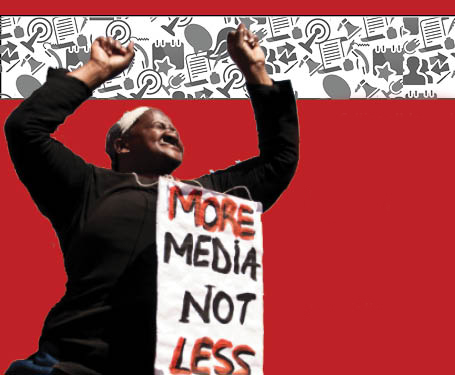
South African-based Right2Know Campaign is hosting a series of conferences to explore how the country’s media environment can be improved. Read the report: Media Transformation & the Right to Communicate
The media does not care about us, they never report things relevant to us and papers are only interested if there is bad news about us, the elderly, gap-toothed man says.
The digital revolution is also passing his community by, he adds. His deeply lined face and brow offer testimony to his day-to-day battle to eke out a life in the “temporary relocation area” of Blikkiesdorp, where many of Cape Town’s disenfranchised have washed up.
“Internet is expensive and doesn’t work well there, and there’s nothing in the papers that talks to us and about our struggle and lives. It’s like we don’t exist.”
The man is an “ordinary citizen” who took part in last weekend’s Cape Town leg of a countrywide series of Media Transformation and Right to Communicate summits organised by the Right2Know Campaign.
“As inequality deepens and social cohesion falters, South Africa needs a media that can offer expression to the full range of voices and facilitate the substantive and complex debates about the social and economic future of the country,” says Mark Weinberg, national coordinator of R2K.
Issues on the agenda include the need for a free and diverse press, the concentration of ownership of South Africa’s media in the hands of four dominant players and the ongoing political interference in the affairs of the SABC, as the ANC tightens its control of the state broadcaster. Participants also voiced concerns at the slow pace of South Africa’s transition to digital terrestrial TV, which will free up bandwidth for high-speed internet and new independent radio and TV stations.
During one session, a community journalist from one of Cape Town’s poorest townships angrily berated the big media houses and called on his “comrades” to march on their offices to “force” them to fund smaller, struggling independent media. Around the room, I noted many others nodding in agreement.
The anger at a perceived lack of transformation in the country’s media is fueled by the fact that the print media is still largely dominated by a handful of powerful companies, even though the landscape has shifted since the birth of a new, democratic South Africa in 1994. The anger was not only aimed at big media houses which stand accused of using predatory pricing tactics to force smaller, less well-resourced outlets out of business.
Participants also had their sights firmly set on government and its failure to support independent community print and radio. Often the main source of income for some small media is paid-for government advertorial, another participant pointed out. The result is that recipients of this revenue are reluctant to rock the boat and report critical stories about government for fear of losing this vital income.
The summits come against the backdrop of a new push by the government to introduce a Media Appeals Tribunal amidst ongoing reporting by South African media on corruption and the squandering of taxpayer money as the economy contracts, raising fears of recession.
William Bird, the head of Media Monitoring Africa says the Media Appeals Tribunal “is bad because, aside from the potential limitations to freedom of expression, it simply won’t address the core concerns over the quality of news content, diversity, transformation and what some perceive as overly negative coverage”.
As a journalist, I was often taken aback during the course of the summit at the depth of anger and isolation felt by ordinary people, especially those from poor communities who felt the media serves the rich and that they are denied a voice.
Nevertheless, I left the summit feeling hopeful. The passion of the man from Blikkiesdorp and others like him and their determination to take the fight to big media and government help remind me that while South Africa may have problems, our democracy remains strong and robust.
This column was posted on 26 November 2015 at indexoncensorship.org





